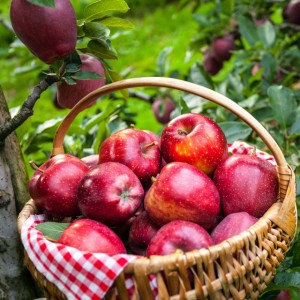 When I think of the fall, I think of harvest – reaping the yield of produce that was tended to all summer in crops and gardens. It’s a time of ripened abundance when we literally enjoy the fruits of our labor – a time when we experience growth, productivity, and completion. Bushel baskets overflow as vibrant colors begin to fade and turn. Days grow shorter, and sunlight wanes minute-by-minute. Sadly, the landscape transitions to brown and barren in its pallid journey toward colder temperatures. The sense of closure begins to overwhelm many. Our productive and vibrant season appears to die and come to an end. Sometimes it feels more like loss when the lifeless signs of a winter pause replace the active flurry to gather-in.
When I think of the fall, I think of harvest – reaping the yield of produce that was tended to all summer in crops and gardens. It’s a time of ripened abundance when we literally enjoy the fruits of our labor – a time when we experience growth, productivity, and completion. Bushel baskets overflow as vibrant colors begin to fade and turn. Days grow shorter, and sunlight wanes minute-by-minute. Sadly, the landscape transitions to brown and barren in its pallid journey toward colder temperatures. The sense of closure begins to overwhelm many. Our productive and vibrant season appears to die and come to an end. Sometimes it feels more like loss when the lifeless signs of a winter pause replace the active flurry to gather-in.
In a contemplative space of harvest, I consider my personal growing seasons – times of planting, cultivating, harvesting, and rest. Why is it that when I’m not producing, I feel incomplete? Why is it that more satisfaction comes from the plethora of active growth and vibrant energy? Why do I discount the time of rest and judge myself so harshly?
Winter is the slowest growing season in an apple orchard, but it’s also one of the most important. Cold winters are very important for apple trees. The trees need rest to produce flowers and fruit each year. It takes about 900 to 1,000 hours below 45 degrees to prepare the trees for the next season. While the trees are resting, they are pruned. Extra wood is cut out so plenty of light can reach the leaves and fruit. This helps keep the tree healthy and prepare it for an abundant harvest of nutritious, tasty apples with good color.
Maybe I am like an apple tree, complete and whole in all of my forms and all of my creative seasons. There is purpose and intention to the cycles of my life. Sometimes I’m quiet and germinating. At other times, I’m in full production. When I embrace the intention of rest and go within, I can grow into my highest potential. Actually, I can become so much more than I can even imagine.
In the spring, when temperatures begin to warm, buds appear on the branches of an apple tree and leaves begin to emerge. Beautiful, fragrant apple blossoms bloom into their full grandeur, and the tree is a spectacular sight. The sweet spring version of an apple tree is whole and complete in and of itself. Festivals bring people together to celebrate the trees in full bloom. Florists use apple blossoms in creative designs and the branches have inspired many artists. Apple blossoms are a Chinese symbol for beauty and immortality. The apple blossom encourages action, motion, courage, and passion. If I were an apple blossom, I would arguably be complete and whole and enough.
The beautiful, fragrant blossoms are only one function and stage of the apple tree. When pollinated by insects, the next miracle of life begins and an apple grows in place of the fading blossom. As the blossoms die and fall away, the tree is filled with apples and the growing season starts over. Plush green leaves warm the landscape as apples grow and turn a variety of hues. Soon the leaves turn into magnificent fall colors and the apples ripen. Once again, it’s time for harvest. Apples can be used to eat, cook with, make beverages, and so much more. The apple, as a fruit, is complete and whole and the fruit produces seeds, which are complete and whole.
With all of this abundant life, we mustn’t dismiss the simple elegance and genius of Nature’s plan. Winter is necessary. Rest is essential. Pause is imperative. And, the bare winter tree is complete and whole in itself.
William Arthur Ward said, “Faith sees a beautiful blossom in a bulb, a lovely garden in a seed, and a giant oak in an acorn.” It is time we see ourselves with this same faith and magnificent potential. This year, as I fall forward into the quiet space of rest, renewal, and regeneration, I will honor this season with gratitude and reverence. When I’m not “producing,” I will experience myself in all of my wholeness. I will cherish the time of rest and remember my precious birthright to blossom, grow, and flourish. I will not only harvest and celebrate the fruits of my labor, but also mindfully gather the seeds of potentiality and hold sacred my ability to plant them.
Life is perfect. The cycles and seasons are purposeful. As an expression of this Divine Creation, I will allow my true essence to emerge in all of its glorious and splendid forms. I am enough and I am whole.

Feedback